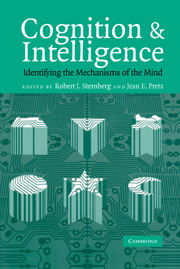Book contents
- Frontmatter
- Contents
- Preface
- 1 Information Processing and Intelligence: Where We Are and Where We Are Going
- 2 Mental Chronometry and the Unification of Differential Psychology
- 3 Reductionism versus Charting: Ways of Examining the Role of Lower-Order Cognitive Processes in Intelligence
- 4 Basic Information Processing and the Psychophysiology of Intelligence
- 5 The Neural Bases of Intelligence: A Perspective Based on Functional Neuroimaging
- 6 The Role of Working Memory in Higher-Level Cognition: Domain-Specific versus Domain-General Perspectives
- 7 Higher-Order Cognition and Intelligence
- 8 Ability Determinants of Individual Differences in Skilled Performance
- 9 Complex Problem Solving and Intelligence: Empirical Relation and Causal Direction
- 10 Intelligence as Smart Heuristics
- 11 The Role of Transferable Knowledge in Intelligence
- 12 Reasoning Abilities
- 13 Measuring Human Intelligence with Artificial Intelligence: Adaptive Item Generation
- 14 Marrying Intelligence and Cognition: A Developmental View
- 15 From Description to Explanation in Cognitive Aging
- 16 Unifying the Field: Cognition and Intelligence
- Author Index
- Subject Index
- References
11 - The Role of Transferable Knowledge in Intelligence
Published online by Cambridge University Press: 23 November 2009
- Frontmatter
- Contents
- Preface
- 1 Information Processing and Intelligence: Where We Are and Where We Are Going
- 2 Mental Chronometry and the Unification of Differential Psychology
- 3 Reductionism versus Charting: Ways of Examining the Role of Lower-Order Cognitive Processes in Intelligence
- 4 Basic Information Processing and the Psychophysiology of Intelligence
- 5 The Neural Bases of Intelligence: A Perspective Based on Functional Neuroimaging
- 6 The Role of Working Memory in Higher-Level Cognition: Domain-Specific versus Domain-General Perspectives
- 7 Higher-Order Cognition and Intelligence
- 8 Ability Determinants of Individual Differences in Skilled Performance
- 9 Complex Problem Solving and Intelligence: Empirical Relation and Causal Direction
- 10 Intelligence as Smart Heuristics
- 11 The Role of Transferable Knowledge in Intelligence
- 12 Reasoning Abilities
- 13 Measuring Human Intelligence with Artificial Intelligence: Adaptive Item Generation
- 14 Marrying Intelligence and Cognition: A Developmental View
- 15 From Description to Explanation in Cognitive Aging
- 16 Unifying the Field: Cognition and Intelligence
- Author Index
- Subject Index
- References
Summary
A prerequisite for cognitively complex behavior in a given realm is the possession of a well differentiated yet integrated knowledge base that gets operated on by efficient cognitive processes.
(Ceci, 1996, p. 22)The transferability of learning is of prime importance in evaluating these educational claims … the transferability of skills is key: If the skills developed by such [educational and training] efforts do not transfer beyond the training context, much of the investment may be considered wasted.
(Barnett & Ceci, 2002)In the past decade, a new approach to understanding development has been put forward that describes a specific form of interaction between biology and environment, called the “bioecological model” (Ceci, 1996; Bronfenbrenner & Ceci, 1993, 1994). The goal of this chapter is to describe how a bioecological approach informs the study of intellectual development. In doing this, we shall focus on the evidence for the tenet of bioecological theory that is most relevant to intellectual functioning, namely, the knowledge-dependent nature of information processing. Following a description of the evidence for this tenet, we will segue into a discussion of the role of the transferability of knowledge in intellectual competence.
The bioecological approach to development posits a close interplay between knowledge and processing efficiency. What this means in the realm of intellectual competence is that, except for the most basic and dedicated processes (e.g., feature detection), processing efficiency is a function of interaction between genetic potentials for processing and the richness of the knowledge base on which the processes operate.
Information
- Type
- Chapter
- Information
- Cognition and IntelligenceIdentifying the Mechanisms of the Mind, pp. 208 - 224Publisher: Cambridge University PressPrint publication year: 2004
References
Accessibility standard: Unknown
- 1
- Cited by
